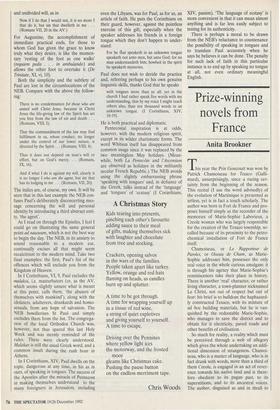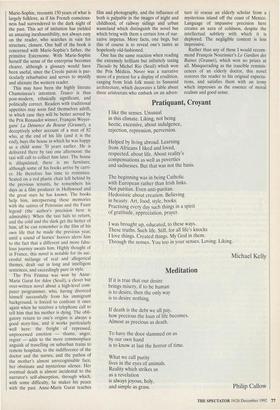Prize-winning novels from France
Anita Brookner
his year the Prix Goncourt was won by Patrick Chamoiseau for Texaco (Galli- mard), unsurprisingly, since a racing cer- tainty from the beginning of the season. This recital (I use the word advisedly) of the evolution of Martinique is presented as artless, yet is in fact a touch scholarly. The author was born in Fort de France and pro- poses himself simply as the recorder of the memories of Marie-Sophie Laborieux, a Creole woman who was largely responsible for the creation of the Texaco township, so- called because of its proximity to the petro- chemical installation of Fort de France itself.
Chamoiseau, or Le Rapporteur de Paroles, or Oiseau de Cham, as Marie- Sophie addresses him, possesses the only real voice in the whole curious amalgam: it is through his agency that Marie-Sophie's reminiscences take their place in history. There is another 'real' character, or rather living character, a town-planner nicknamed Le Christ, not out of respect but out of fear: his brief is to bulldoze the haphazard- ly constructed Texaco, with its mixture of ad hoc building materials, but he is van- quished by the redoutable Marie-Sophie, who manages to save the district and to obtain for it electricity, paved roads and other benefits of civilisation.
So much for reality, a reality which must be perceived through a web of allegory which gives the whole undertaking an addi- tional dimension of strangeness. Chamoi- seau, who is a master of language, who is in fact drunk with words, more than a third of them Creole, is engaged in an act of rever- ence towards his native land and is there- fore obedient to its pagan past, to its superstitions, and to its ancestral voices. The author, disguised as and in thrall to
Marie-Sophie, recounts 150 years of what is largely folklore, as if his French conscious- ness had surrendered to the dark night of the past. This act of imitation has yielded an amazing inexhaustibility, not always easy on the reader, who searches in vain for structure, closure. One half of the book is concerned with Marie-Sophie's father, the primitive Esternome. With Marie-Sophie herself the sense of the enterprise becomes clearer, although a glossary would have been useful, since the Creole patois is par- ticularly rebarbative and serves to mystify and alienate the western reader.
This may have been the highly literate Chamoiseau's intention. Texaco is thus post-modern, ethnically significant, and politically correct. Readers with traditional appetites may soon find themselves adrift, in which case they will be better served by the Prix Renaudot winner, Francois Weyer- gans' La Demence du Boxeur (Grasset), a deceptively sober account of a man of 82 who, at the end of his life (and it is the end), buys the house in which he was happy as a child some 70 years earlier. He is delivered there by taxi one afternoon: the taxi will call to collect him later. The house is dilapidated; there is no furniture, although some of his books arrive by carri- er. He therefore has time to reminisce. Seated on a red plastic chair left behind by the previous tenants, he remembers his days as a film producer in Hollywood and the great stars he has known. The books help him, interpsersing these memories with the satires of Petronius and the Faust legend (the author's precision here is admirable). When the taxi fails to return, and the cold and the dark get the better of him, all he can remember is the film of his own life that he made the previous year, until a sound of horses' hooves alerts him to the fact that a different and more fabu- lous journey awaits him. Highly thought of in France, this novel is notable for its suc- cessful mélange of real and allegorical themes, dealt out in long and intelligent sentences, and exceedingly pure in style.
The Prix Femina was won by Anne- Marie Garat for Aden (Seuil), a clever but over-written novel about a high-level com- puter programmer, who, having divorced himself successfully from his immigrant background, is forced to confront it once again when he receives a telephone call to tell him that his mother is dying. The obli- gatory return to one's origins is always a good story-line, and it works particularly well here: the freight of repressed, unprocessed emotion — shame, anger, regret — adds to the more commonplace anguish of travelling on suburban trains to remote hospitals, to the indifference of the doctor and the nurses, and the pathos of the mother's almost unrecognisable face, her obstinate and mysterious silence. Her eventual death is almost incidental to the narrator's self-absorption, through which, with some difficulty, he makes his peace with the past. Anne-Marie Garat teaches
film and photography, and the influence of both is palpable in the images of night and childhood, of railway sidings and urban wasteland which distinguish the novel but which bring with them a certain loss of nar- rative impetus. More facts, one begs, but this of course is to reveal one's tastes as hopelessly old-fashioned.
One has the same reaction when reading the extremely brilliant but infinitely taxing Tlacuilo by Michel Rio (Seuil) which won the Prix Medicis. Never was a narrative more of a pretext for a display of erudition, ranging from Irish folk music to Sassanid architecture, which decorates a fable about three aristocrats who embark on an adven-
ture td rescue an elderly scholar from a mysterious island off the coast of Mexico. Language of impassive precision here creates an aura of coldness, despite the intellectual subtlety with which it is deployed. The negligible content is less impressive.
Rather than any of these I would recom- mend Francois Nourissier's Le Gardien des Ruines (Grasset), which won no prizes at all. Masquerading as the irascible reminis- cences of an elderly doctor, this novel restores the reader to his original expecta- tions, and satisfies them with an irony which impresses as the essence of moral realism and good sense.











































































































 Previous page
Previous page